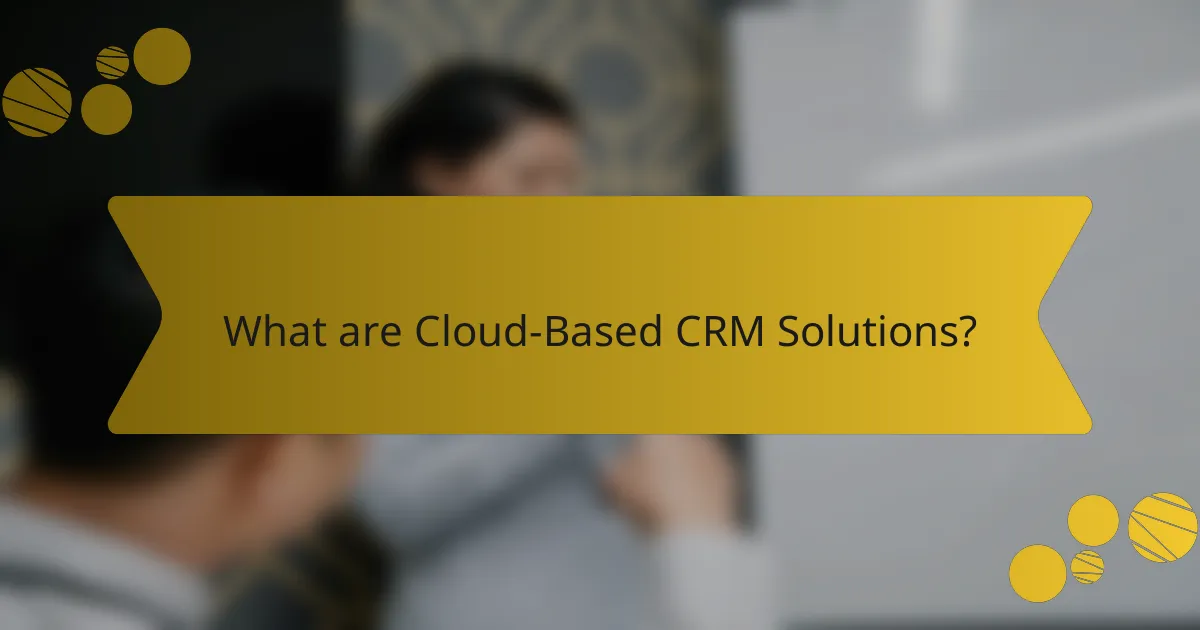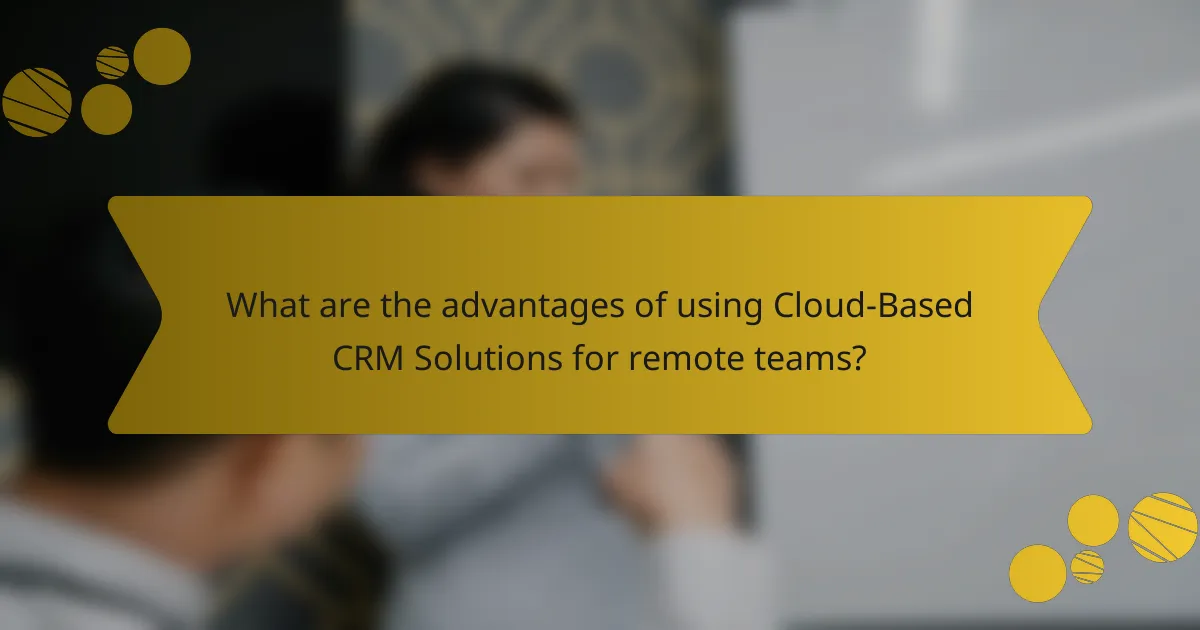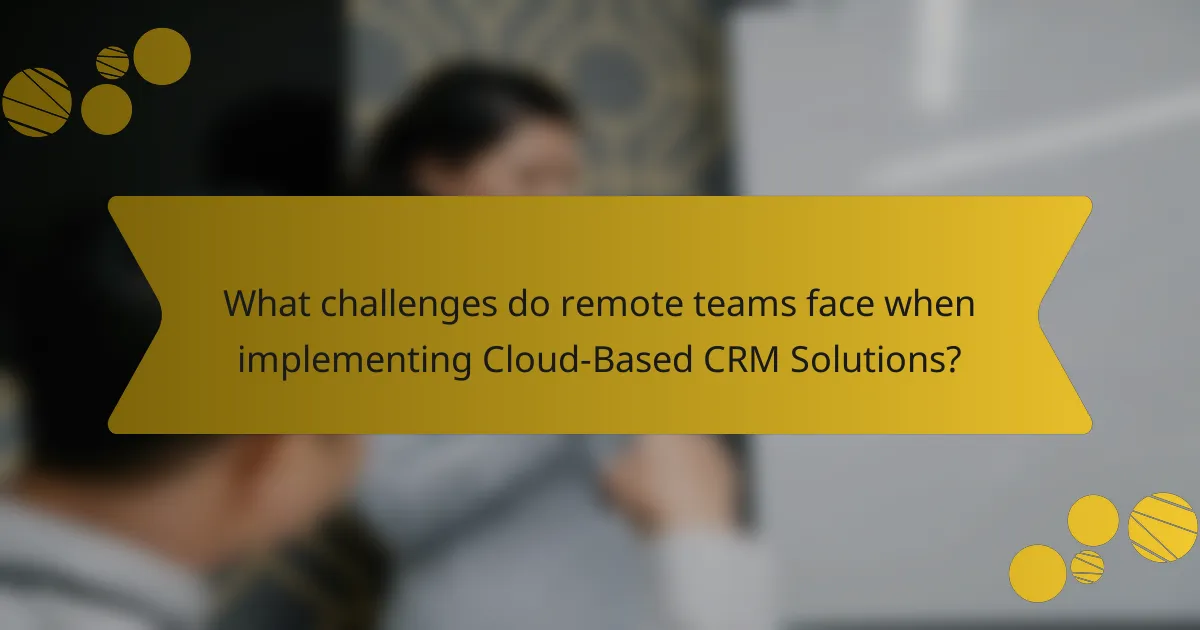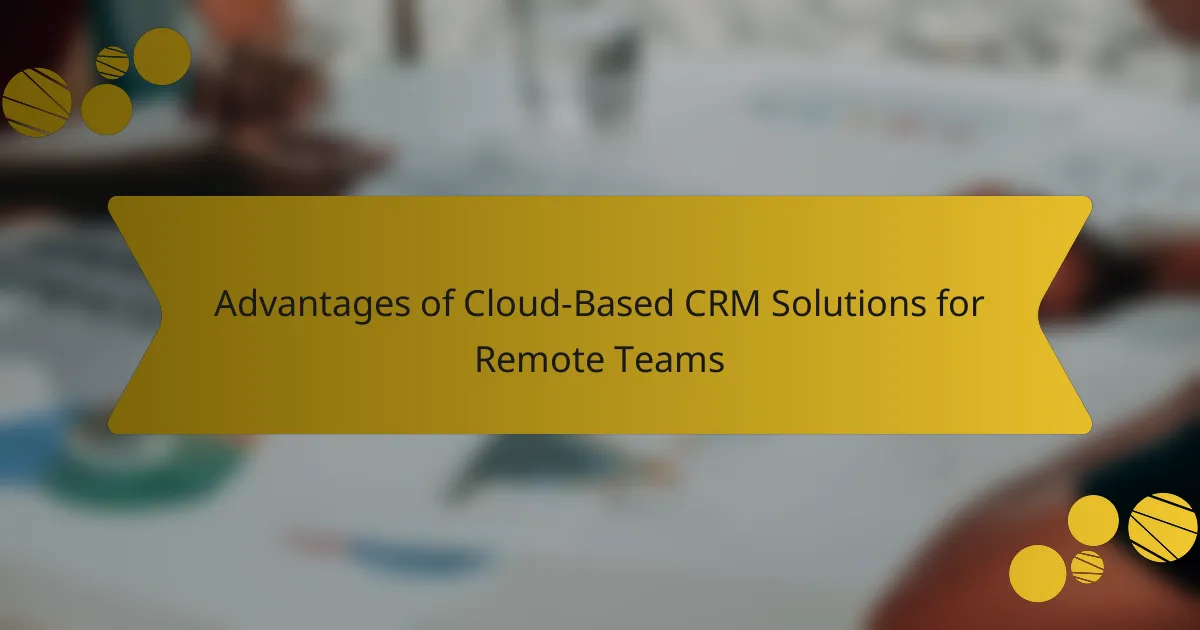Cloud-based Customer Relationship Management (CRM) solutions are systems hosted on remote servers that enable users to access CRM tools via the internet, eliminating the need for on-premise installations. These solutions provide significant advantages for remote teams, including real-time access to customer data, enhanced collaboration, integrated communication tools, automation features for efficiency, scalability for team growth, and robust data security. However, challenges such as data security concerns, the necessity for reliable internet connectivity, user adoption issues, integration difficulties, and communication barriers can hinder their effectiveness. The article examines both the benefits and challenges of implementing cloud-based CRM solutions for remote teams, highlighting their growing importance in modern business operations.

What are Cloud-Based CRM Solutions?
Cloud-based CRM solutions are customer relationship management systems hosted on remote servers. They allow users to access CRM tools via the internet. This setup eliminates the need for on-premise hardware and software installations. Users can access their data from any location with internet connectivity. Cloud-based CRM systems often provide automatic updates and maintenance. This reduces the IT burden on organizations. According to a report by Gartner, 70% of organizations are expected to adopt cloud CRM by 2025. This trend highlights the growing reliance on cloud technologies for business operations.
How do Cloud-Based CRM Solutions differ from traditional CRM systems?
Cloud-based CRM solutions differ from traditional CRM systems primarily in their accessibility and deployment. Cloud-based systems are hosted on remote servers and accessible via the internet. This allows users to access customer data from anywhere, at any time. Traditional CRM systems, on the other hand, are often installed on local servers and require on-site access.
Cloud solutions typically offer automatic updates and maintenance, reducing the burden on IT resources. Traditional systems often require manual updates, which can lead to outdated software. Additionally, cloud-based CRMs usually operate on a subscription model, providing flexibility in costs. Traditional CRMs often involve significant upfront investments in hardware and software.
Scalability is another key difference. Cloud-based CRMs can easily scale to accommodate growing teams and data needs. Traditional systems may require complex upgrades to scale effectively. Security measures also differ; cloud providers often implement advanced security protocols, while traditional systems rely on local security measures that may vary widely.
These distinctions highlight how cloud-based CRM solutions are better suited for remote teams, enabling greater collaboration and efficiency.
What key features define Cloud-Based CRM Solutions?
Cloud-based CRM solutions are defined by several key features. They offer accessibility from any device with internet connectivity. This ensures that remote teams can access customer data in real-time. Scalability is another essential feature, allowing businesses to adjust their CRM usage according to their needs. Data security is prioritized, with cloud providers implementing robust measures to protect sensitive information. Integration capabilities with other software enhance functionality and streamline processes. Additionally, cloud-based CRMs often include automation tools, which improve efficiency by reducing manual tasks. Lastly, they typically feature customizable dashboards for tailored user experiences. These attributes collectively enhance collaboration and productivity for remote teams.
What are the deployment models for Cloud-Based CRM Solutions?
The deployment models for Cloud-Based CRM Solutions are primarily categorized into three types: public cloud, private cloud, and hybrid cloud. Public cloud CRM solutions are hosted on third-party servers and are accessible over the internet. They offer scalability and cost-effectiveness but may raise data security concerns. Private cloud CRM solutions are dedicated to a single organization, providing enhanced security and control over data. They require more resources and management but are ideal for businesses with strict compliance needs. Hybrid cloud CRM solutions combine elements of both public and private clouds. This model allows organizations to leverage the benefits of both environments, enabling flexibility and optimized resource allocation. According to Gartner, organizations adopting hybrid cloud solutions experience improved operational efficiency and agility.
Why are Cloud-Based CRM Solutions essential for remote teams?
Cloud-based CRM solutions are essential for remote teams because they enable seamless collaboration and access to data from any location. These solutions allow team members to work together in real-time, regardless of their physical location. With cloud-based systems, remote workers can access customer information, track interactions, and manage tasks efficiently. This accessibility leads to improved communication and productivity among team members. According to a study by Salesforce, 70% of sales teams report increased productivity with cloud-based CRM tools. Additionally, cloud-based CRMs often provide automated updates and integrations with other tools, streamlining workflows for remote teams.
How do Cloud-Based CRM Solutions facilitate collaboration among remote teams?
Cloud-Based CRM Solutions enhance collaboration among remote teams by providing real-time access to shared information. These platforms allow team members to update and view customer data simultaneously. This ensures everyone is on the same page, reducing miscommunication. Additionally, cloud-based systems often include integrated communication tools, such as chat and video conferencing. This facilitates direct interaction among team members, regardless of location. According to a report by Gartner, 70% of employees feel more engaged when using collaborative software. Furthermore, cloud solutions enable task assignment and tracking, which improves accountability within teams. Overall, the accessibility and integration of features streamline workflows and enhance productivity for remote teams.
What security measures are in place for Cloud-Based CRM Solutions?
Cloud-Based CRM Solutions implement various security measures to protect user data. These measures include data encryption during transmission and storage. Encryption ensures that sensitive information remains confidential. Access controls limit user permissions based on roles. This minimizes the risk of unauthorized access. Multi-factor authentication adds an extra layer of security. It requires users to verify their identity through multiple methods. Regular security audits assess vulnerabilities and compliance. These audits help identify potential risks and enhance security protocols. Additionally, data backup and recovery solutions safeguard against data loss. This ensures business continuity in case of an incident. Overall, these measures create a robust security framework for Cloud-Based CRM Solutions.

What are the advantages of using Cloud-Based CRM Solutions for remote teams?
Cloud-Based CRM Solutions offer several advantages for remote teams. First, they provide real-time access to customer data from any location. This accessibility enhances collaboration among team members. Second, these solutions facilitate seamless communication through integrated tools. Remote teams can share updates and insights instantly. Third, Cloud-Based CRMs often include automation features. These features streamline repetitive tasks, improving efficiency. Fourth, they offer scalability to accommodate team growth. Organizations can easily adjust their subscriptions as needed. Lastly, data security is typically robust in Cloud-Based solutions. Providers invest in advanced security measures to protect sensitive information. These advantages collectively enhance productivity and team performance for remote workers.
How do Cloud-Based CRM Solutions enhance productivity for remote teams?
Cloud-based CRM solutions enhance productivity for remote teams by providing real-time access to customer data. This access allows team members to collaborate seamlessly from different locations. They can update and retrieve information instantly, reducing delays in communication. Cloud solutions also facilitate task automation, which streamlines workflows and minimizes manual errors. According to a study by Nucleus Research, companies that use cloud-based CRM see an average productivity increase of 15%. Additionally, these systems support integration with other tools, creating a unified platform for team collaboration. Enhanced data security features protect sensitive information, ensuring compliance and trust. Overall, cloud-based CRM solutions empower remote teams to work more efficiently and effectively.
What tools within Cloud-Based CRM Solutions improve team communication?
Cloud-based CRM solutions improve team communication through tools like integrated messaging systems, collaborative document sharing, and real-time updates. Integrated messaging systems allow team members to communicate instantly within the platform. This enhances quick decision-making and reduces email overload. Collaborative document sharing enables teams to work together on files in real-time. It ensures everyone has access to the latest information. Real-time updates keep team members informed about customer interactions and project changes. This transparency fosters better coordination. Overall, these tools streamline communication processes and enhance teamwork efficiency.
How do these solutions streamline workflow processes for remote teams?
Cloud-based CRM solutions streamline workflow processes for remote teams by providing centralized access to information. These platforms enable team members to collaborate in real-time, regardless of location. They allow for seamless sharing of customer data and project updates. Automated task management features help prioritize and assign responsibilities efficiently. Integration with other tools enhances productivity by reducing the need for manual data entry. Analytics and reporting capabilities offer insights into team performance and customer interactions. Research shows that companies using cloud-based solutions see a 20-30% increase in productivity. This efficiency directly supports remote teams in achieving their goals effectively.
What cost benefits do Cloud-Based CRM Solutions provide for remote teams?
Cloud-based CRM solutions provide significant cost benefits for remote teams. They reduce the need for extensive IT infrastructure. Remote teams can access the CRM from anywhere, minimizing travel and operational costs. Subscription-based pricing models lower upfront expenses compared to traditional software. Maintenance and updates are managed by the provider, saving additional costs. Scalability allows teams to adjust their usage based on current needs, avoiding overpayment. According to a report by Nucleus Research, companies see an average ROI of $8.71 for every dollar spent on CRM solutions. This demonstrates the financial efficiency of cloud-based systems for remote work.
How do subscription models impact the overall cost for businesses?
Subscription models can reduce overall costs for businesses by providing predictable revenue streams. These models allow companies to better manage cash flow and allocate resources efficiently. With subscription services, businesses often avoid large upfront costs associated with traditional purchasing. This can lead to lower initial investments in technology or services.
Additionally, subscription models can include maintenance and updates, reducing ongoing operational costs. According to a study by McKinsey, companies using subscription models reported a 20% increase in customer retention. Higher retention rates often translate to lower marketing costs for acquiring new customers.
Overall, subscription models create a more sustainable financial structure for businesses. They enable scalability and flexibility in operations, further contributing to cost-effectiveness.
What are the long-term financial advantages of adopting Cloud-Based CRM Solutions?
Cloud-Based CRM Solutions offer significant long-term financial advantages. They reduce upfront infrastructure costs by eliminating the need for on-premises hardware. Businesses can save on maintenance and upgrade expenses, as updates are managed by the service provider. Scalability allows companies to pay only for what they use, optimizing costs as they grow.
According to a study by Nucleus Research, companies see an average return on investment of $8.71 for every dollar spent on CRM systems. Additionally, cloud solutions often enhance productivity, leading to increased sales and revenue. Reduced downtime and improved customer service can further contribute to financial benefits. Overall, these factors create a compelling case for the long-term financial advantages of adopting Cloud-Based CRM Solutions.

What challenges do remote teams face when implementing Cloud-Based CRM Solutions?
Remote teams face several challenges when implementing Cloud-Based CRM solutions. One significant challenge is ensuring data security. Remote access increases vulnerability to cyber threats. Another challenge is the need for reliable internet connectivity. Poor connections can disrupt access to the CRM system. Additionally, remote teams may struggle with user adoption. Employees may resist changes to their workflow. Integration with existing systems can also pose difficulties. Compatibility issues may arise, complicating the transition process. Finally, remote teams often encounter communication barriers. Misunderstandings can occur without face-to-face interactions. These challenges can hinder the effectiveness of Cloud-Based CRM implementations.
How can remote teams overcome resistance to adopting new technology?
Remote teams can overcome resistance to adopting new technology by implementing clear communication strategies. Engaging team members in discussions about the benefits of the technology fosters understanding. Providing training sessions helps build confidence in using new tools. Encouraging feedback allows team members to voice concerns and suggestions. Highlighting success stories within the organization demonstrates the technology’s value. Setting clear expectations for technology use promotes accountability. Offering ongoing support ensures team members feel supported during the transition. Research shows that organizations with strong change management practices see a 70% success rate in technology adoption.
What training resources are available for effective implementation?
Training resources for effective implementation of cloud-based CRM solutions include online courses, webinars, and user manuals. Online platforms like Coursera and Udemy offer structured courses on CRM systems. Webinars hosted by CRM vendors provide real-time training and Q&A sessions. User manuals and documentation from CRM providers detail features and best practices. Additionally, community forums and support groups foster peer learning and troubleshooting. These resources help users understand functionalities and enhance adoption rates.
How can teams ensure smooth integration with existing systems?
Teams can ensure smooth integration with existing systems by conducting thorough assessments of current infrastructure. Understanding existing workflows is crucial for identifying potential integration challenges. They should also prioritize selecting cloud-based CRM solutions that offer compatibility with existing software. Utilizing APIs can facilitate data exchange between systems seamlessly. Additionally, teams must engage in proper training for users to adapt to the new system efficiently. Regular communication between stakeholders can help address integration issues promptly. A phased implementation approach allows for gradual adjustments and testing. According to a study by Salesforce, 70% of successful integrations stem from comprehensive planning and stakeholder involvement.
What best practices should remote teams follow when using Cloud-Based CRM Solutions?
Remote teams should follow several best practices when using Cloud-Based CRM solutions. First, they must ensure consistent data entry. This practice maintains data integrity and accuracy. Second, teams should utilize training resources. Training enhances user proficiency and system utilization. Third, regular updates and maintenance are crucial. This keeps the CRM software secure and functional. Fourth, teams should leverage automation features. Automation streamlines repetitive tasks and improves efficiency. Fifth, they must establish clear communication protocols. Effective communication enhances collaboration and reduces misunderstandings. Lastly, teams should regularly review and analyze CRM data. This practice helps identify trends and inform decision-making. Following these best practices maximizes the benefits of Cloud-Based CRM solutions for remote teams.
How can teams maximize the features of Cloud-Based CRM Solutions?
Teams can maximize the features of Cloud-Based CRM Solutions by leveraging their accessibility and integration capabilities. These solutions allow team members to access customer data from any location, facilitating real-time collaboration. Integration with other tools enhances workflow efficiency, enabling seamless communication and task management. Customization options allow teams to tailor the CRM to their specific needs, improving user engagement. Regular training sessions ensure that all team members are proficient in using the CRM features effectively. Utilizing analytics features helps teams track performance and customer interactions, driving informed decision-making. Adopting best practices in data management enhances the overall effectiveness of the CRM. By continuously evaluating and optimizing usage, teams can fully harness the potential of Cloud-Based CRM Solutions.
What strategies can enhance user adoption and engagement?
Effective strategies to enhance user adoption and engagement include providing comprehensive training and support. Training equips users with the necessary skills to utilize the system effectively. Support channels, such as help desks or chatbots, facilitate immediate assistance.
Regular communication about updates and features keeps users informed and engaged. This transparency builds trust and encourages exploration of the system’s capabilities.
Gamification elements, such as rewards for usage, can motivate users to engage more frequently. Research indicates that gamification boosts engagement rates by up to 48%.
Feedback mechanisms allow users to share their experiences, promoting a sense of ownership. Implementing user suggestions can lead to improvements that align the system with user needs.
Lastly, showcasing success stories illustrates the benefits of the system, encouraging others to adopt it. These strategies collectively foster a positive user experience and drive higher adoption rates.
Cloud-based CRM solutions are customer relationship management systems hosted on remote servers, enabling users to access tools via the internet. This article examines the advantages of these solutions for remote teams, highlighting key features such as real-time data access, scalability, and enhanced collaboration. It also discusses deployment models, security measures, and cost benefits associated with cloud-based CRM systems. Additionally, the article addresses challenges remote teams may face during implementation and offers best practices to maximize user engagement and system effectiveness.
